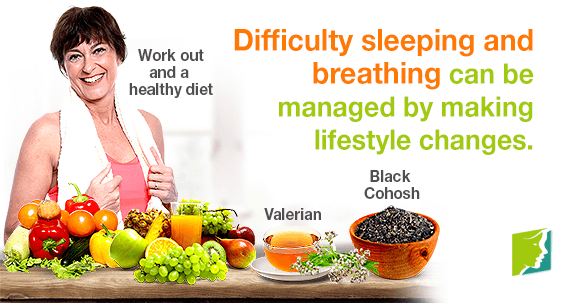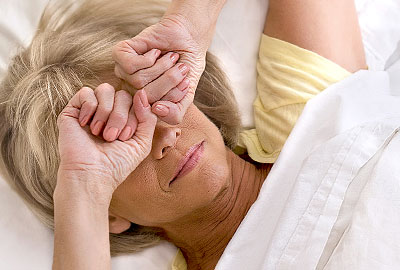Sleeping issues are very common among menopausal women. Tossing, turning, and staring at the clock for hours can begin to weigh down on your ability to seize the day. Around 80% of Americans experience insomnia at some point, whether chronic or situational. It can be more alarming, however, when breathlessness accompanies your sleeplessness. Some individuals will endure situations where they wake up gasping for air, which is characteristic of a common sleep disorder, sleep apnea.
Why Can't I Sleep?
The main reason why women have sleeping problems during menopause is hormonal changes in the body. Sex hormone levels, such as estrogen, plummet during menopause, which affects one's brain chemistry, thereby reducing neurotransmitters that are essential for falling asleep at night. There are other lifestyle choices that factor in as well, such as a diet full of fats, sugars, and caffeine, and absent of whole grains, colorful vegetables, and lean proteins. Also, when someone leads a sedentary lifestyle, they don't tire themselves out. This makes it much harder to fall asleep once they lay down to bed because they've already been immobile all day.
Does Anxiety Factor in?
Another side effect of lowered estrogen levels is reduced endorphins and serotonin - which keep you happy and relaxed - and an increase of a stress response hormone called cortisol. This will keep you on edge and in a state of alert instead of relaxation. On a physical level, anxiety causes increased circulation, rapid heartbeat, and shallow breathing. All of your concerns tend to amplify in the night and can make you paranoid about the littlest things, which will only snowball and keep you up longer and longer. Read about dealing with anxiety and sleep problems.
Why Do I Experience Breathlessness?
Sleep apnea is a condition where people experience breathlessness that can wake them up. Apnea means “not breathing”, hence sleep apnea is when your sleep is interrupted because your airway becomes closed off. This can happen several hundred times overnight. Sometimes, it is only a few seconds, but other times, you may stop breathing for two minutes. It disturbs your sleep because the brain gets an alert that it is not receiving oxygen and you wake up, often gasping, to restore your breath. Although sometimes you can sleep through this and not notice, other times, it can be very frightening.
What Can I Do to Overcome it?
Apnea is dangerous because it interrupts breathing, disturbs sleep, and can lead to daytime sleepiness during important tasks. The best treatment route depends on each individual's circumstances. If you are overweight, it is crucial to work toward a healthy weight through exercise and a healthy diet - not only to manage sleep apnea, but also for your overall well-being.
Perimenopausal women can also increase estrogen levels by consuming phytoestrogenic herbs, such as black cohosh in tea or supplemental form. In addition, if you are having trouble falling asleep, valerian, an herb that safely induces sleepiness, may help.
Going through menopause can throw many difficult circumstances your way. Things that were once no problem can cause intense reactions at this time. Difficulty sleeping is frustrating and exhausting, and to have breathlessness with it can be scary and upsetting. Once you detect you are having these problems, you should look towards making lifestyle changes to improve sleep.
Sources
- National Heart, Lung, and Blood Institute. (2012). What Is Sleep Apnea. Retrieved May 14, 2014, from http://www.nhlbi.nih.gov/health/health-topics/topics/sleepapnea/
- National Institutes of Health. (2014). Sleep Disorders. Retrieved May 14, 2014, from http://www.nlm.nih.gov/medlineplus/sleepdisorders.html
- University of Maryland Medical Center. (2013). Adult Sleep Disorders. Retrieved May 14, 2014, from http://umm.edu/programs/sleep/health/sleep-disorders/adult
- University of Maryland Medical Center. (2011). Valerian. Retrieved May 14, 2014, from http://umm.edu/health/medical/altmed/herb/valerian




